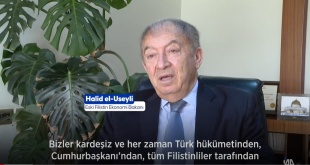Encouraging Business in Palestine
https://thisweekinpalestine.com/encouraging-business-in-palestine/
Encouraging Business in Palestine
Fostering an Enabling Environment for Growth
By Khaled Al-Osaily
Palestine’s path toward creating an enabling business environment has been marked by unwavering determination, even amidst a multitude of challenges. The core pillar of this endeavor lies in the implementation of a comprehensive reform agenda that is supported by international partners and aims to bolster the business infrastructure and enhance regulatory and policy frameworks. Seeking new business opportunities, Palestine is a land of promise, offering numerous incentives and a supportive ecosystem for thriving businesses.
There are many reasons to start a business in Palestine. The country offers numerous opportunities: (i) Palestine is exhibiting dynamic and steady economic growth that is driven by diverse sectors such as agriculture, energy, tourism, ICT, industry, and logistics, and by its educated and skilled human capital. (ii) Palestine’s strategic location and rich natural resources are further assets. The region’s strategic location between Asia, Europe, and Africa, coupled with its abundant natural resources, provides a fertile ground for various industries. (iii) The access to global markets is a corollary of Palestine’s strategic geographical position and offers easy access to regional and international markets, bolstered by trade agreements and the proximity to major trade routes.
The abounding prospects and opportunities are other factors that can attract businesses. Palestine’s fertile lands make agriculture very appealing, and a diverse climate allows for the year-round production of vegetables and various agricultural products. Other promising sectors include the energy sector. Boasting offshore gas reserves and over 300 sunny days per year, Palestine is an attractive destination for investment in this sector. Moreover, the country holds significant untapped potential for renewable energy sources, opening doors to sustainable and innovative projects. Best-known is most likely Palestine’s great potential in the tourism sector. World-class religious and historical sites, an attractive climate, and a rich cultural heritage present many opportunities in this field. Insiders are well aware of Palestine’s potential when it comes to information and communications technology (ICT). As the fastest-growing sector in Palestine, ICT provides opportunities for research, development, and innovation. Similarly, the financial technology industry offers modern solutions to expand the efficiency of financial services, while innovative ideas to contribute to the greening industry provide promising opportunities in the clean tech industry. Opportunities exist also in light industries and in such sectors as stone, marble, construction, pharmaceuticals, agro-industries, and leather and shoes, among others. In addition, a prominent sector for investment lies in the green industries, such as recycling, green building, and waste and water management. Further opportunities may be found in logistics and transportation, where investments in storing, packaging, and shipping freight services are needed. Finally, ongoing developments in infrastructure and real estate create opportunities for investments.

Palestine offers plenty of investment and business opportunities in the fields of agriculture, energy, tourism, information and communications technology, fintech, clean tech, light industries, logistics and transportation, infrastructure and real estate, stone, marble, construction, pharmaceuticals, agro-industries, leather and shoes, green building, recycling, and water and waste management.
The Palestinian government is fully committed to developing a supportive ecosystem. It has created a competitive legal framework that is transparent and predictable and ensures investor protection. Thus, the government guarantees that there is no expropriation or nationalization of businesses, ensures equal treatment for investors of all nationalities, and confirms the protection of all confidential information. Investors are welcomed with a variety of incentives that include free investments in all business sectors in any ownership percentage and easy repatriation of profits. In addition, foreign investors enjoy free transfers of generated profits.
Palestine furthermore boasts robust, organized, and active financial systems, including banking and nonbanking services governed by the Palestine Monetary Authority (PMA) and Palestine Capital Market Authority (PCMA). The country’s Sustainability Fund supports investment in various sectors such as health, electronic education, digital transformation, recovery, and growth. Furthermore, there are no limitations on currency exchange rates or foreign currency transfers to overseas destinations.
At the core of Palestine’s mission to create a business-friendly climate lies the comprehensive reform agenda that paves the way for progress. Led by the Ministry of National Economy, this agenda aims to advance a conducive business environment for the private sector to start business in Palestine. A key aspect of this initiative is the “Business Regulatory Environment Report,” developed in cooperation with the International Finance Corporation (IFC), providing a comprehensive analysis of Palestine’s business environment. The report highlights regulatory governance and digital readiness, offering valuable insights and recommendations with clear priorities and time-bound milestones for different phases of a firm’s life cycle, including entry and exit, getting a location, and operations and expansion.
Based on the “Business Regulatory Environment Report,” the recommendations regarding firm entry and exit focus on the regulations that affect business registration, closure, or restructuring. Obtaining a location encompasses aspects such as land acquisition, compliance with construction regulations, electricity network connections, and the overall quality of land management systems. Also, the operation of firms is examined in terms of tax obligations, credit infrastructure, and corporate governance provisions, as is the efficiency of the judicial system.

Palestinian efforts to swiftly implement the reform agenda persist with unwavering determination and resilience even though the country faces many challenges that include limited resources, limited institutional capacities, restricted access to finance, and a general lack of awareness of the existing opportunities and the financial tools that are available to start and expand the business. However, the prominent obstacle of Israeli restrictions on the reform process adds complexity, prolonging its execution and increasing costs. In our pursuit to establish a favorable business environment that is conducive to initiatives such as the implementation of solar panels, industrial estates, and free zones, we recognize the critical significance of accessing natural resources, particularly in the area known as C, which is largely restricted by the occupation.
Fully acknowledging the fundamental role of freedom of movement in successful business ventures, we collaborate with the international community to alleviate Israeli impediments as well as encourage investment in the infrastructure and transportation mechanisms. This responsibility is shared with the business community and aims to remove Israeli constraints on movement, further unlocking the potential for growth and development.
Our approach centers on transforming obstacles into opportunities. With each challenge we encounter, Palestine emerges stronger and more resolute in nurturing an environment that fosters prosperity and progress. Our steadfast vision for the future envisions Palestine not solely as a land of history but also as a realm of boundless opportunities, inviting investors to join us in crafting a flourishing and prosperous tomorrow.
Empowering businesses through a multifaceted approach comprises a number of factors. It requires a competitive legal and policy framework that paves the way for business growth, the building of a robust business infrastructure, the promotion of women’s economic empowerment, and the bridging of the perception gap that fails to do justice to the many achievements that Palestine can boast of despite the occupation.

The Palestinian Ministry of National Economy’s reform recommendations focus on proposing regulatory and administrative reforms to foster a more enabling and conducive business environment in the region. The aim is to turn obstacles into opportunities as we envision a prosperous future.
The Ministry of National Economy has been diligently working on enhancing laws and regulations, providing a robust legal framework for business growth. Notably, it encourages business entry into the Palestinian market. The recent overhaul of the Companies Law, which was developed with the support of the World Bank, reflects Palestine’s commitment to transparency, oversight, and ease of doing business. Numerous new elements introduced in the new Companies Law bring Palestine’s legal system up to par with international best practices. The Companies Law’s provisions enable online registration of companies and the electronic registration of amendments to further contribute to the ease of doing business. This modern approach replaces cumbersome paperwork and bureaucratic hurdles, significantly reducing the time and effort required to establish and manage businesses.
Crucially, the new Companies Law significantly improves the framework for foreign investors. By removing restrictions that previously limited foreign investment, such as the requirement of having a resident representative in Palestine for any foreign company, the law opens the door for increased foreign direct investment (FDI). Foreign investors are now allowed to directly own shares and membership interests in local companies without the need to register local branches, which simplifies the entry process and encourages foreign capital inflow.
Moreover, foreign companies now have the option to establish branches and subsidiaries in Palestine, offering them greater flexibility in conducting business operations. By facilitating foreign companies’ presence in the country, the new Companies Law enhances collaboration between local and international entities, fostering technology transfer, knowledge sharing, and market access.

In addition, the elimination of minimum capital requirements for private companies and mandatory reserves for shareholding companies (unless required by special legislation) creates a more attractive investment landscape. This move encourages small and medium-sized enterprises (SMEs) and startups to flourish, as they are no longer burdened by stringent capital requirements, which stimulates entrepreneurship and innovation.
Moreover, efforts are underway to develop the Insolvency Law. This contributes to a competitive legal framework for business exits that is supported in collaboration with the European Bank for Reconstruction and Development. In addition, the ministry is working on crucial regulations that encourage business innovation, including modernizing the Investment Law to encompass potential investment sectors and offering tax and non-tax incentives. The establishment of a streamlined one-stop-shop procedure aims to save both effort and cost for businesses.
Furthermore, the ministry’s efforts extend to develop the law to protect intellectual property, which preserves rights and encourages innovation, research, and development. The ministry is actively working on an E-commerce Law, Accreditation Law, and Technical Regulation Bylaw, among others. These endeavors further bolster the competitive legal and regulatory landscape. Each new element in these laws aligns Palestine with international best practices, enhancing investor confidence and providing a conducive environment for businesses to thrive.
Complementing these legal advancements is the development of a National Industrial Policy Framework to empower industry development and digitization. This framework lays the groundwork for innovation and sustainable growth across sectors, ensuring that Palestine’s industrial sector becomes more efficient, digitized, and environmentally friendly, and opening new opportunities for investors who seek to be part of a forward-looking economy.

The ministry’s commitment to economic empowerment is evident through the formulation of a dedicated strategy for MSMEs (micro, small, and medium enterprises) and green development. This strategy focuses on supporting and nurturing the growth of MSMEs, the backbone of Palestine’s economy. By providing tailored support and incentives, the strategy aims to create an enabling ecosystem that fosters entrepreneurship, drives job creation, and contributes significantly to the country’s economic development. Through a comprehensive approach, the MSMEs strategy aims to unlock the full potential of small businesses and startups, driving innovation and inclusive growth.
To bolster the business environment, the Palestinian Ministry of National Economy adopts a multifaceted approach, diligently implementing reform recommendations.
To develop a robust business infrastructure, Palestine’s government, through the Investment Promotion and Industrial Estate Agency IPIEA, has established specialized development zones and industrial estates, such as Jericho Agricultural Industrial Park (JAIP), Gaza Industrial Estate, and Bethlehem Industrial Park, with Jenin Industrial Free Zone and Tarqumiya Industrial Park under construction. These endeavors aim to attract businesses to start and establish their ventures in Palestine. The industrial infrastructure showcases Palestine’s commitment to promoting investment.
The IPIEA provides special incentives within these industrial estates, which include financial incentives such as its Soft Loan Program, and direct financial support through the Investment Partnership Program for Regional Development and Employment (PRIDE) and French grants (up to 50 percent) as well as capacity-building programs, B2B networking, and access to market programs. Preferential industrial electricity tariffs, electric power production stations, and the installation of solar panels reduce production costs.
In order to streamline and modernize the business registry process according to the Companies Law, a full implementation of the automation of the business registry is being undertaken, in cooperation with UNCTAD, to install a modernized user-friendly model. This project is supported by the World Bank under the IPDP project.
Moreover, to reduce compliance burdens on businesses and foster a business-friendly environment while safeguarding the public good, the ministry works on rationalization and streamlining the inspection regimes and is developing a streamlined, transparent, and cost-efficient licensing regime under BRIDG, which is supported by The World Bank and the European Union.
The recently launched EU-Palestine Investment Platform testifies to international confidence in the Palestinian economy.
Women’s economic empowerment is promoted through several measures. A new report titled Women in Business and Management, issued by International Labour Organization’s Bureau for Employers’ Activities, shows that gender diversity improves business outcomes and makes it easier to attract talent. The report also found that an increase in female employment is positively associated with GDP growth.
Recognizing the impact of gender diversity on business outcomes and economic growth, Palestine is focused on promoting women’s economic empowerment. Initiatives include the encouragement of companies to include more women in management and on their boards, based on the rules of the new Palestinian Companies Law. Other efforts include the launch of the E-Souq portal that promotes women’s products and enhances their access to markets, the adoption of business models that provide economic opportunities for women, and the encouragement of increased participation of women in leadership positions in the private sector by integrating the principles of women’s economic empowerment into private sector institutions.
The 2nd EU-Palestine Business Forum, to be held on October 24 in Bethlehem, will connect European investors with Palestinian counterparts.
Seeing is believing. We must bridge the perception gap. Amidst the well-known de facto reality of Palestine being under occupation, there exists a lesser-known truth that remains largely unexplored by many. Palestine takes pride in its pioneering and exceptional success stories across various industries, including tourism, pharmaceuticals, food, stone and marble, plastics, leather and shoes, textiles, agriculture, and technology. Unfortunately, the efficiency and significant contributions of Palestinian human capital, particularly women in business leadership, often go unnoticed.

To dispel the stereotype and bridge this gap, we actively endeavor to strengthen bilateral relations with countries worldwide. We extend cordial invitations, urging visitors to experience Palestine’s dynamic and innovative business environment firsthand. Seeing is believing, and we firmly believe that witnessing our achievements will challenge preconceived notions.
We have already welcomed esteemed businesspersons from fraternal Arab nations such as Libya and Jordan, along with countries from afar, such as France and Lithuania. Their visits have left these visitors inspired by the flourishing and distinguished business sector in Palestine. As a result, many have embarked on successful business partnerships, leaving no doubt that investing in Palestine is a viable and fruitful venture.
In a testament to confidence in the Palestinian economy, the EU and the Palestinian government have launched the EU-Palestine Investment Platform that encourages policy dialogue on investment and mobilizes high-quality investments. Financial tools, including loans, grants, guarantees, equity investments, and technical assistance, aid investors in making informed decisions while also improving the investment environment through policy reforms. Team Europe partners collaborate through this platform to maximize development financing benefits, promoting inclusive growth, job creation, and sustainable development. With over €1.6 billion (which accounts for over 10 percent of the Palestinian GDP) invested in Palestine – with a focus on increasing SMEs’ access to finance, green economy initiatives, sustainable agriculture, and digitalization to promote sustainable development – the commitment of Team Europe partners to the Palestinian economy is evident.
The forthcoming 2nd EU-Palestine Business Forum is scheduled for October 24 in Bethlehem. This event aims to facilitate connections between European investors and their Palestinian counterparts, further strengthening the European Union’s confidence in the potential of the Palestinian economy. With invitations extended to 500 business leaders and investors and European development banks, the forum promises to be an enriching networking opportunity.
Palestine’s dedication to surmounting challenges and fostering a conducive business environment resonates through comprehensive reforms, supportive policies, and an open invitation to investors worldwide. We stand poised to transform challenges into prosperous opportunities, forging ahead into a future that is defined by growth, innovation, and sustainable economic prosperity. The call to investors is resounding: Come and explore the tremendous business opportunities that Palestine has to offer!
 Khaled Osaily. خالد العسيلي رئيس بلدية الخيل السابق خالد العسيلي
Khaled Osaily. خالد العسيلي رئيس بلدية الخيل السابق خالد العسيلي






